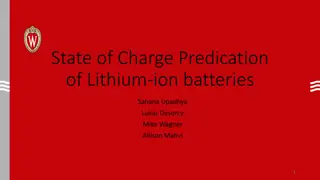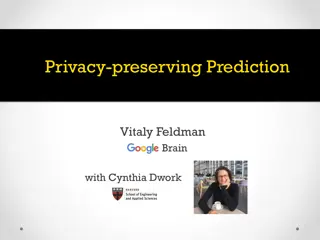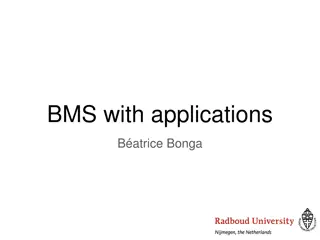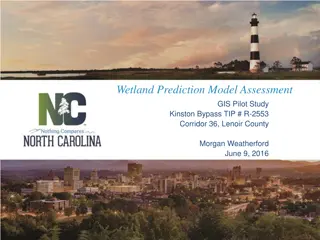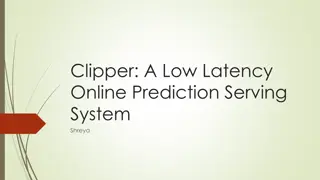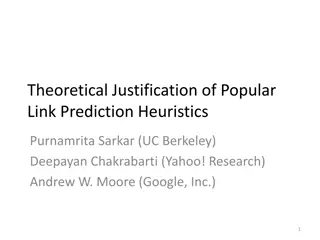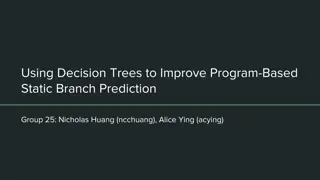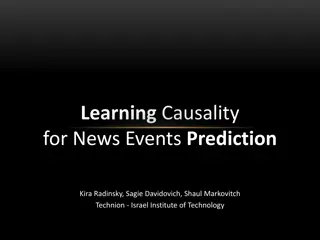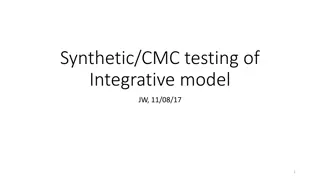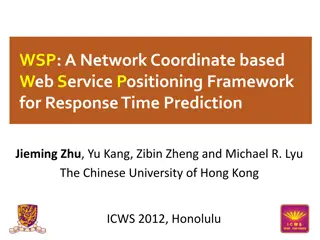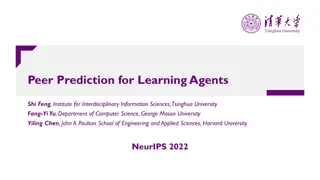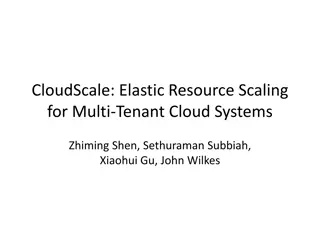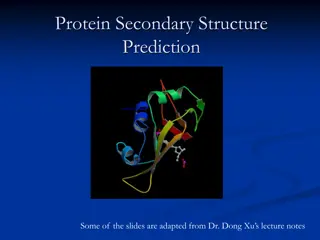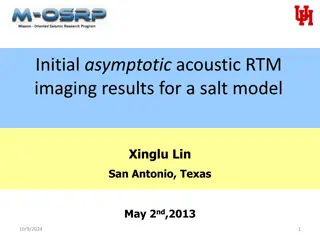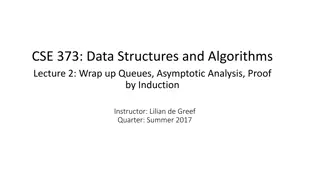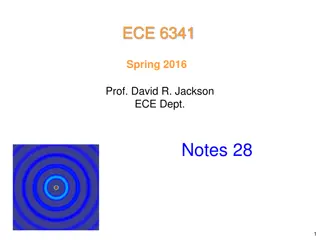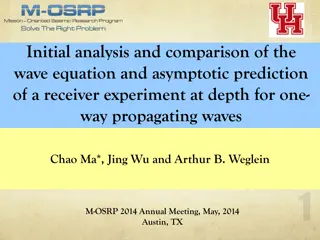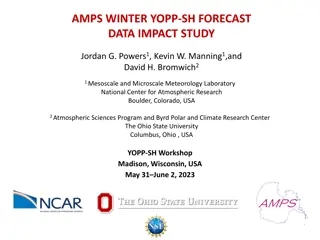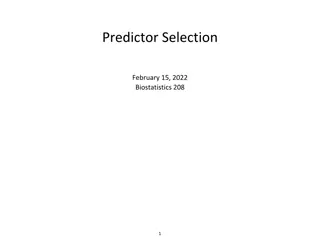Address Prediction and Recovery in EECS 470 Lecture Winter 2024
Explore the concepts of address prediction, recovery, and interrupt recovery in EECS 470 lecture featuring slides developed by prominent professors. Topics include branch predictors, limitations of Tomasulo's Algorithm, various prediction schemes, branch history tables, and more. Dive into bimodal,
7 views • 42 slides
H.264/AVC: Key Concepts and Features
Exploring the fundamentals of MPEG-4 Part 10, also known as H.264/AVC, this overview delves into the codec flow, macroblocks, slices, profiles, reference picture management, inter prediction techniques, motion vector compensation, and intra prediction methods used in this advanced video compression
6 views • 32 slides
Advancements in Air Pollution Prediction Models for Urban Centers
Efficient air pollution monitoring and prediction models are essential due to the increasing urbanization trend. This research aims to develop novel attention-based long-short term memory models for accurate air pollution prediction. By leveraging machine learning and deep learning approaches, the s
4 views • 17 slides
State of Charge Prediction in Lithium-ion Batteries
Explore the significance of State of Charge (SOC) prediction in lithium-ion batteries, focusing on battery degradation models, voltage characteristics, accurate SOC estimation, SOC prediction methodologies, and testing equipment like Digatron Lithium Cell Tester. The content delves into SOC manageme
1 views • 32 slides
KFRE: Validated Risk Prediction Tool for Kidney Replacement Therapy
KFRE, a validated risk prediction tool, aids in predicting the need for kidney replacement therapy in adults with chronic kidney disease. Developed in Canada in 2011, KFRE has undergone validation in over 30 countries, showing superior clinical accuracy in KRT prediction. Caution is advised when usi
4 views • 9 slides
Real-time Experimental Lightning Flash Prediction Report
This Real-time Experimental Lightning Flash Prediction Report presents a detailed analysis of lightning flash forecasts based on initial conditions. Prepared by a team at the Indian Institute of Tropical Meteorology, Ministry of Earth Sciences, India, the report includes data on accumulated total li
17 views • 6 slides
Privacy-Preserving Prediction and Learning in Machine Learning Research
Explore the concepts of privacy-preserving prediction and learning in machine learning research, including differential privacy, trade-offs, prediction APIs, membership inference attacks, label aggregation, classification via aggregation, and prediction stability. The content delves into the challen
7 views • 11 slides
Asymptotic Structure in Physical Spacetime
Exploring the implications of asymptotic flatness and symmetry in physical spacetime, focusing on concepts like conformal completion, Einstein's equations, and the Bondi-Metzner-Sachs group (BMS) for providing physical interpretations of mass, linear momentum, and angular rotation subgroups.
5 views • 28 slides
Wetland Prediction Model Assessment in GIS Pilot Study for Kinston Bypass
Wetland Prediction Model Assessment was conducted in a GIS pilot study for the Kinston Bypass project in Lenoir County. The goal was to streamline project delivery through GIS resources. The study focused on Corridor 36, assessing various wetland types over a vast area using statistical and spatial
2 views • 16 slides
Clipper: A Low Latency Online Prediction Serving System
Machine learning often requires real-time, accurate, and robust predictions under heavy query loads. However, many existing frameworks are more focused on model training than deployment. Clipper is an online prediction system with a modular architecture that addresses concerns such as latency, throu
4 views • 17 slides
Theoretical Justification of Popular Link Prediction Heuristics
This content discusses the theoretical justification of popular link prediction heuristics such as predicting connections between nodes based on common neighbors, shortest paths, and weights assigned to low-degree common neighbors. It also explores link prediction generative models and previous empi
4 views • 39 slides
Using Decision Trees for Program-Based Static Branch Prediction
This presentation discusses the use of decision trees to enhance program-based static branch prediction, focusing on improving the Ball and Larus heuristics. It covers the importance of static branch prediction, motivation behind the research, goals of the study, and background on Ball and Larus heu
5 views • 36 slides
Causality in News Event Prediction
Learning about the significance of predictions in news events and the process of causality mining for accurate forecasting. The research delves into problem definition, solution representation, algorithms, and evaluation in event prediction. Emphasis is placed on events, time representation, predict
3 views • 36 slides
Overview of Synthetic Models in Transcriptional Data Analysis
This content showcases various synthetic models for analyzing transcriptome data, including integrative models, trait prediction, and deep Boltzmann machines. It explores the generation of synthetic transcriptome data and the training processes involved in these models. The use of Restricted Boltzma
0 views • 14 slides
Network Coordinate-based Web Service Positioning Framework for Response Time Prediction
This paper presents the WSP framework, a network coordinate-based approach for predicting response times in web services. It explores the motivation behind web service composition, quality-of-service evaluation, and the challenges of QoS prediction. The WSP framework enables the selection of web ser
4 views • 30 slides
Peer Prediction Mechanisms in Learning Agents
Peer prediction mechanisms play a crucial role in soliciting high-quality information from human agents. This study explores the importance of peer prediction, the mechanisms involved in incentivizing truthful reporting, and the convergence of learning agents to truthful strategies. The Correlated A
0 views • 7 slides
CloudScale: Elastic Resource Scaling for Multi-Tenant Cloud Systems
CloudScale is an automatic resource scaling system designed to meet Service Level Objective (SLO) requirements with minimal resource and energy cost. The architecture involves resource demand prediction, host prediction, error correction, virtual machine scaling, and conflict handling. Module 1 focu
4 views • 37 slides
Amendments to WIPPS Manual for Climate Prediction at INFCOM-3, April 2024
The document discusses amendments to the Manual on WIPPS for climate prediction, including new recommendations for weather, climate, water, and environmental prediction activities. It introduces concepts such as Global Climate Reanalysis and the coordination of multi-model ensembles for sub-seasonal
3 views • 10 slides
Protein Secondary Structure Prediction: Insights and Methods
Accurate prediction of protein secondary structure is crucial for understanding tertiary structure, predicting protein function, and classification. This prediction involves identifying key elements like alpha helices, beta sheets, turns, and loops. Various methods such as manual assignment by cryst
7 views • 30 slides
ACE RAM Workshop - Barcelona 2019: Reliability and Maintenance Concepts
The ACE RAM Workshop conducted by George Pruteanu in Barcelona focused on topics such as RAM prediction, FMEA, maintenance concepts, preventive and predictive maintenance, condition monitoring systems, corrective maintenance, and design for maintenance. The workshop delved into reliability predictio
4 views • 16 slides
Flexoelectric Materials and Their Asymptotic Behavior in Crack Development
Explore the utilization of asymptotic approaches to analyze crack development in flexoelectric materials, considering the influence of intensity of applied stress, limitations, advantages, and the connection to singular perturbation methods. Discover the intriguing property of flexoelectric material
0 views • 17 slides
Initial Asymptotic Acoustic RTM Imaging Results in Salt Model
Acquire insights into the initial asymptotic acoustic RTM imaging results for a salt model in Xinglu Lin, San Antonio. This study delves into the concept of Reverse Time Migration (RTM), showcasing the methodology, workflow, and imaging conditions involved in this innovative seismic imaging techniqu
1 views • 22 slides
CSE 373 Data Structures and Algorithms Lecture Wrap-up: Queues, Asymptotic Analysis, Proof by Induction
In this lecture, we wrapped up discussions on queues, started asymptotic analysis including Big-O notation, and delved into proof by induction. The instructor, Lilian de Greef, covered various topics essential for understanding data structures and algorithms. Additionally, announcements were made re
3 views • 32 slides
Asymptotic Evaluation Techniques in Integral Calculus
Learn about asymptotic evaluation of integrals through techniques like integration by parts and the stationary-phase method. Understand how to handle integrals involving real functions, and grasp the significance of concepts like the Riemann-Lebesgue lemma and small o notation. Delve into the physic
3 views • 21 slides
Analysis and Comparison of Wave Equation Prediction for Propagating Waves
Initial analysis and comparison of the wave equation and asymptotic prediction of a receiver experiment at depth for one-way propagating waves. The study examines the amplitude and information derived from a wave equation migration algorithm and its asymptotic form. The focus is on the prediction of
0 views • 23 slides
AMPS WINTER YOPP-SH FORECAST DATA IMPACT STUDY
This study focuses on the impact of enhanced sounding data and new data assimilation methods on Antarctic weather forecasts. Utilizing the Year of Polar Prediction Southern Hemisphere program, researchers aim to improve environmental prediction for the polar regions through targeted observing period
3 views • 16 slides
Advanced Branch Prediction
Techniques for reducing branch cost through advanced branch prediction methods such as static and dynamic prediction, branch correlation, and prediction of branch targets are essential for enhancing processor performance. Control speculation with branch prediction is utilized in modern processors wi
4 views • 26 slides
Python Implementation of Recommendation Algorithms for Rating Prediction and Item Recommendation
This Python library, CaseRecommender, provides implementations of various recommendation algorithms supporting rating prediction and item recommendation scenarios. It includes algorithms like ItemKNN, Matrix Factorization with BPR, UserKNN for item recommendation and Matrix Factorization, SVD, Item
4 views • 8 slides
Asymptotic Series: Properties and Notations
Asymptotic series play a crucial role in analyzing functions as their magnitude grows. Explore the properties and notations of asymptotic series, including Big O and Small o notations. Learn how these series show the behavior of functions as their input values increase.
2 views • 39 slides
Biostatistics Predictor Selection and Prediction Error Analysis
Explore the methods for predictor selection in regression models based on inferential goals in biostatistics, focusing on prediction error measures for model validation and the bias-variance tradeoff to avoid overfitting. An example prediction tool development process is also highlighted, emphasizin
1 views • 63 slides
Formal Definition of Asymptotic Notation: t(n) ∈ O(g(n))
Delve into the precise, formal definition of t(n) being in O(g(n)), a fundamental concept in analyzing algorithmic efficiency and growth rates. Learn how to identify and compare functions in asymptotic notation.
0 views • 27 slides
Asymptotic Behavior in Algorithms
Explore the concept of asymptotic behavior in algorithms, focusing on Big-O notation, complexity analysis, and algorithm performance scalability as input size grows. Discover how to evaluate algorithmic cost functions independently of specific hardware or implementation details.
2 views • 39 slides
Optimizing Algorithm Efficiency Through Asymptotic Notation and Sort Complexity
Explore concepts of asymptotic notation, worst-case analysis, and MergeSort in computer science. Get ready for the upcoming midterm, ACE section, homework releases, and office hours. Learn about sorting algorithms and their impact on performance.
0 views • 86 slides
Asymptotic Notations in Algorithms
Learn about major asymptotic notations like Big-O, Big-Omega, Theta, small-o, small-omega, and how they are used to analyze the running time of algorithms based on different growth rates. Explore practical examples and comparisons to enhance your understanding.
3 views • 18 slides
Asymptotic Notations for Algorithm Complexity Analysis
Learn about asymptotic notations such as Big Theta, Big O, and Big Omega to analyze the running time of algorithms in relation to input size. Explore how these notations describe the rate of growth of functions and establish bounds for algorithm efficiency.
3 views • 36 slides
Advanced Branch Prediction Techniques in Computer Science
Explore the innovative approaches to branch prediction in computer science, focusing on controlling hazards, prediction ideas, and prediction methods. Learn how to improve pipeline efficiency and reduce wasted cycles due to control hazards while enhancing the accuracy of predicting the next instruct
1 views • 6 slides
Understanding Asymptotic Behavior in Algorithms
Dive into the concept of asymptotic behavior in algorithms and data structures through examples and methods. Learn why it matters and how to analyze functions as input size approaches infinity, shedding light on the importance of asymptotic analysis for algorithm efficiency.
1 views • 42 slides
Flexoelectric Solid Asymptotic Analysis
Explore the asymptotic development of cracks in flexoelectric materials under mechanical loads and the potential use of intensity factors in linear elastic fracture mechanics. Understand the flexoelectric effect and the inner and outer asymptotic energies for crack development. Discover the properti
2 views • 17 slides
Understanding Algorithm Complexity Through Asymptotic Analysis
Dive into the world of algorithm complexity analysis with a focus on asymptotic notation and finding the asymptotic upper bound of algorithms. Learn how to measure algorithms, compare them, and grasp the significance of resource functions in determining algorithm efficiency.
1 views • 60 slides
Understanding Asymptotic Notations
Learn about Big-O, Big-Omega, Theta, small-o, and small-omega notations in the context of analyzing algorithm efficiency. From defining the notations to understanding relationships between different functions, explore the world of asymptotic notations visually explained with examples.
1 views • 18 slides



